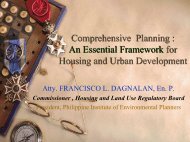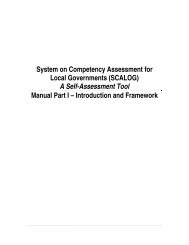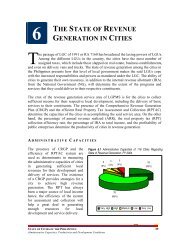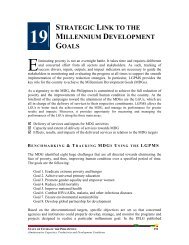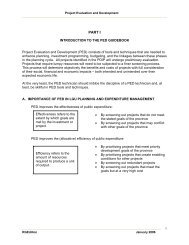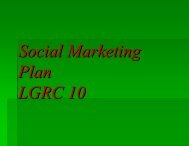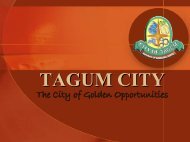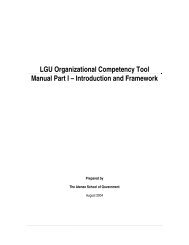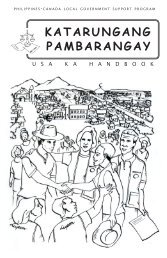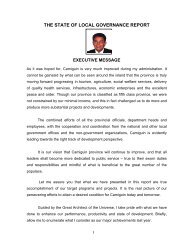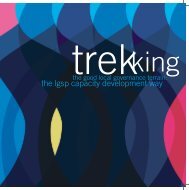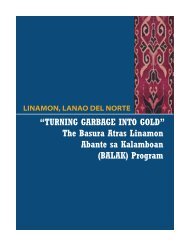Sigma 2005 - LGRC DILG 10
Sigma 2005 - LGRC DILG 10
Sigma 2005 - LGRC DILG 10
Create successful ePaper yourself
Turn your PDF publications into a flip-book with our unique Google optimized e-Paper software.
History: How the project came about<br />
Kasama Ka!: Multistakeholder Partnerships for Solid Waste Management<br />
SIGMA, CAPIZ<br />
After the passage of two landmark national laws on environmental protection,<br />
the Ecological Waste Management Law in 2000 (Republic Act 9003) and the<br />
Clean Air Act in 2001, the municipal government of <strong>Sigma</strong> saw the opportunity<br />
to fulfill their mandate and address their solid waste problem at the same<br />
time.<br />
In August 2002, Mayor Roberto Sualog and the Executive Director of<br />
<strong>Sigma</strong>hanon Development Foundation, Inc. (SDFI), a <strong>Sigma</strong>-based NGO that has<br />
been operating since 1988, attended a Lakbay Aral on Best Practices in Solid<br />
Waste Management facilitated by the Associated Resources for Management<br />
and Development, Inc. (ARMDEV) for the Philippines-Canada Local Government<br />
Support Program (LGSP). The training served as an eye-opener for the LGU and<br />
SDFI, and became the start of a partnership between the two parties.<br />
Inspired and encouraged by what he learned in the Lakbay Aral, Mayor Sualog<br />
issued Executive Order # 07-2002 in December 2002 constituting the Municipal<br />
Solid Waste Management Board (MSWMB), which was later called the KASAMA<br />
KA Board). The SWMB was tasked to formulate and implement a ten-year<br />
Ecological Solid Waste Management (ESWM) Plan. This gave the program its<br />
legal mandate.<br />
Results: Gains from the program<br />
As a result of this program, which took approximately 17 months to implement,<br />
the following gains have been noted:<br />
• A remarkable decline in the<br />
volume of garbage generated<br />
daily, from 8 cu. M. to 3 cu. m.,<br />
or a 62% reduction. This is<br />
because 88% of monthly biowastes<br />
are composted while 12%<br />
are recycled. There is also less<br />
littering, as garbage is being<br />
recycled.<br />
• Declining incidence of wasterelated<br />
diseases, including 60%<br />
decline in cases of acute watery<br />
diarrhea, 30% decline in gastritis<br />
cases, 29% decline in parasitism<br />
cases, and 43% decline in<br />
impetigo cases.<br />
October <strong>2005</strong> 5



